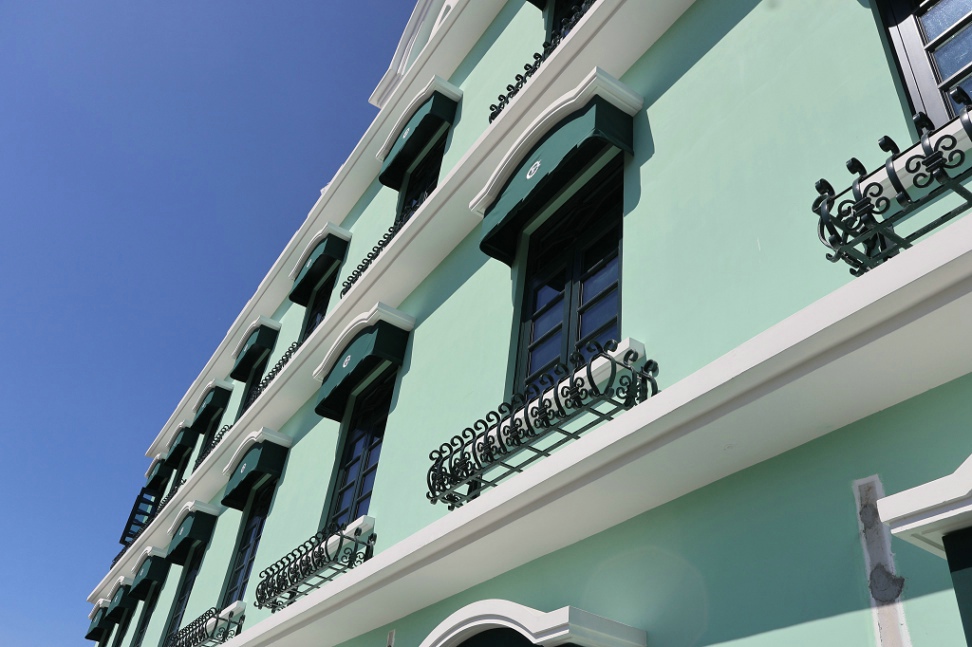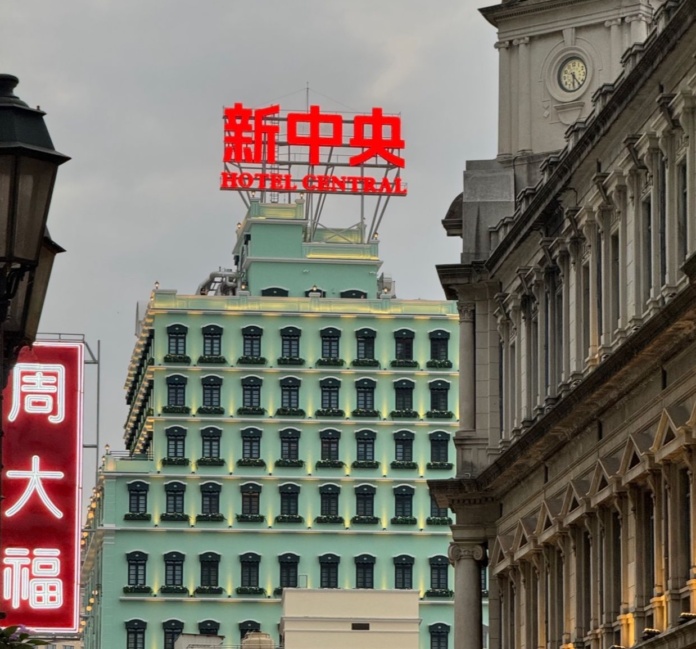António Lobo Vilela is a lawyer based in Macau and the author of the Macau Gaming Law Book
(www.macaugaminglaw.com)
By António Lobo Vilela

At a friend’s kind invitation, I had the pleasure of experiencing a trial stay with my wife at the iconic and recently renovated Hotel Central before it opened to the public.
The Hotel Central is situated on Avenida de Almeida Ribeiro, Macau’s main shopping area, and is easily spotted by the “新中央” (New Central) neon billboard on its rooftop. The hotel (then with 80 rooms) was inaugurated on July 22, 1928, as “President Hotel” by Governor Tamagnini Barbosa. Later, on October 31, 1930, it was renovated and renamed “Grand Hotel Central” by the Iun Iun Company. The Macau government had granted Iun Iun a concession to operate casino games of chance for the first time on a monopoly basis to enhance tax revenues and stimulate economic growth.
In 1937, a new era began as the Tai Heng Company, the new monopolistic casino gaming concessionaire linked to Fu Tak Iam and Kou Ho Neng, took over and transformed the hotel, reopening on May 18, 1937, as “Hotel Central.” For 24 years, seven months, and 13 days (from May 18, 1937, to December 31, 1961), and after three consecutive three-year casino gaming concession contracts (1937-1946), followed by another seven successive two-year contracts (1946-1961), the Hotel Central stood as a symbol of luxury and elegance, and the stage par excellence for casino gaming in Macau.
Hotel Central was the first destination in Macau to offer casino gaming along with other attractions, foreshadowing what is now known as an “integrated resort” or “IR.”

The casino had a luxurious and classic design with avant-garde management, operating on the fourth and seventh floors. Its unique feature was the small reed baskets sent down by cord from the surrounding balconies. These balconies were reserved for members of the Chinese haute monde, mandarins, and other high-ranking officials who wanted to enjoy the game without being noticed by the commoners below. They used the baskets to place their bets, then quickly whisked them off to the croupier. The casino employees donned green and white uniforms, colours that favoured the casino, as Fu Tak Iam, superstitiously, believed red brought bad luck and forbade it from being worn.
The casino offered its patrons (mainly from Hong Kong and mainland China) a variety of games, including fantan, cussec, and p’ai kao. It provided free cigarettes, fruit, food, and Chinese opera performances. The hotel had lavish rooms and boasted ten dining rooms (with chefs from Guangdong), a roof garden, a cinematograph room (comparable to those in Hong Kong or Shanghai), a bar with billiards, a hairdresser, live concerts, nightclubs with dance ballrooms (where dancers were always ready to dance by the hour or by the song), and cabaret shows, including the renowned Grand Central Cabaret. It was also the first building in Macau to have lifts: two, with a capacity for nine people each, used by crowds who went up to see the astounding view from the rooftop. Additionally, it was the first hotel to house a refrigerator, a novelty in Macau at the time. In the late 1940s and 1950s, the hotel’s sixth floor was home to the Golden City restaurant, considered one of the best in town.
The Hotel Central is part of Macau’s collective memory and is a shining example of the innovative initiatives the Macau government should nurture, develop, and even sponsor.
The Hotel Central was Macau’s first skyscraper and the tallest building in the Portuguese Empire, a fact used by the hotel to promote itself. Initially, the building only had seven floors, but four more were added. One was in 1937, and the other three were decided in 1941 due to the ongoing construction of the International Hotel (an Art Deco building a few blocks down the road, in Inner Harbour, also recently revamped and reopened as “Grande Hotel Macau”), projected to have nine floors. However, the Macau government rejected the extension project on safety grounds, and only after an appeal to the Portuguese Supreme Court of Justice was it allowed to move forward.
The Hotel Central has a rich history, with many stories of intrigue and danger, particularly during the Second Sino-Japanese War (1937-1945) when many refugees flooded Macau. Spies have been known to frequent its hallways (and gamble). The hotel was also a popular spot for gangsters, leading to occasional bomb attacks. While these attacks have only caused minor damage and no injuries, there have been several suicides by desperate gamblers and a few murders within the hotel.
During the 1940s and 1950s, the Hotel Central was the setting for multiple cinema movies, including “Macau,” starring famous actors Jane Russell and Robert Mitchum. Clark Gable, William Holden, and Ian Fleming were among the celebrities who stayed at the hotel.
Commissioned by the Sunday Times in 1959 to explore and write about fourteen exotic cities, including Macau, Ian Fleming wrote about Hotel Central:
“[t]he Central Hotel is not precisely a hotel. It is a nine-storey skyscraper, by far the largest building in Macao, and it is devoted solely to the human so-called vices. It has one more original feature. The higher up the building you go, the more beautiful and expensive are the girls, the higher the stakes at the gambling tables, and the better the music. Thus, on the ground floor, the honest coolie can choose a girl of his own class and gamble for pennies by lowering his bet on a fishing-rod contraption through a hole in the floor on to the gaming tables below. Those with longer pockets can progress upwards through various heavens until they reach the earthly paradise on the sixth floor. Above this are the bedrooms. In the pursuit of information which would be in accordance with the readership of the Sunday Times, it was a matter of course that, very soon after our arrival at the Central Hotel, Dick Hughes and I should take the lift to the sixth floor.”
In 1962, the casino gaming concession was awarded to another entity, STDM, causing Hotel Central to decay slowly after the closure of its casino. In 2016, in a bold move, the Lek Hang Group purchased it for around MOP$1.5 billion (USD$187.5 million) and restored it according to the principle of’restoring the old to the old.’ They renovated it while maintaining its historical charm, creating a whole new thing. Even before opening to the public, it had already won the ‘Annual Designer’s Boutique Hotel’ prize for 2024 at the 19th China Tourism and Culture Starlight Awards.
These initiatives are crucial in giving Macau uniqueness and cultural identity, setting it apart from becoming an extension of Zhuhai or an appendage of Hengqin.
The Hotel Central is reopening, with 114 rooms themed to specific eras in the hotel’s history. The fifth and sixth floors are dedicated to the 1920s, focusing on comfortable and relaxed decor. The seventh and eighth floors depict the 1930s and provide historical imprints, recreating Macau’s historic landmarks a century ago. The ninth and tenth floors pay homage to the 1940s, building a bridge between the historic and contemporary Hotel Central. The 360-degree panoramic view from the open-air rooftop promenade remains breathtaking.
The Hotel Central is part of Macau’s collective memory and is a shining example of the innovative initiatives the Macau government should nurture, develop, and even sponsor. These initiatives are crucial in giving Macau uniqueness and cultural identity, setting it apart from becoming an extension of Zhuhai or an appendage of Hengqin. Notably, while it is still unknown what the MOP$142.65 billion (USD$17.8 billion) investment plan of the’six major integrated tourism and leisure companies’ for ten years starting in January 2023 entails, initiatives such as Hotel Central are key to the desired path to diversification and go the extra mile to achieve the goal of making Macau into a truly world centre of tourism and leisure.
The renovated Hotel Central is a testament to the magic and wonder that can be achieved through dedication to excellence.
Best wishes to Hotel Central!
[Note: Most of the facts mentioned are from an article co-authored with Pedro Cortés, entitled “Uncle Stanley, The Dancing King of Gambling Who Promised and Delivered the Moon,” published in the journal Gaming Law Review, vol. 23, no. 3, April 2022].
























